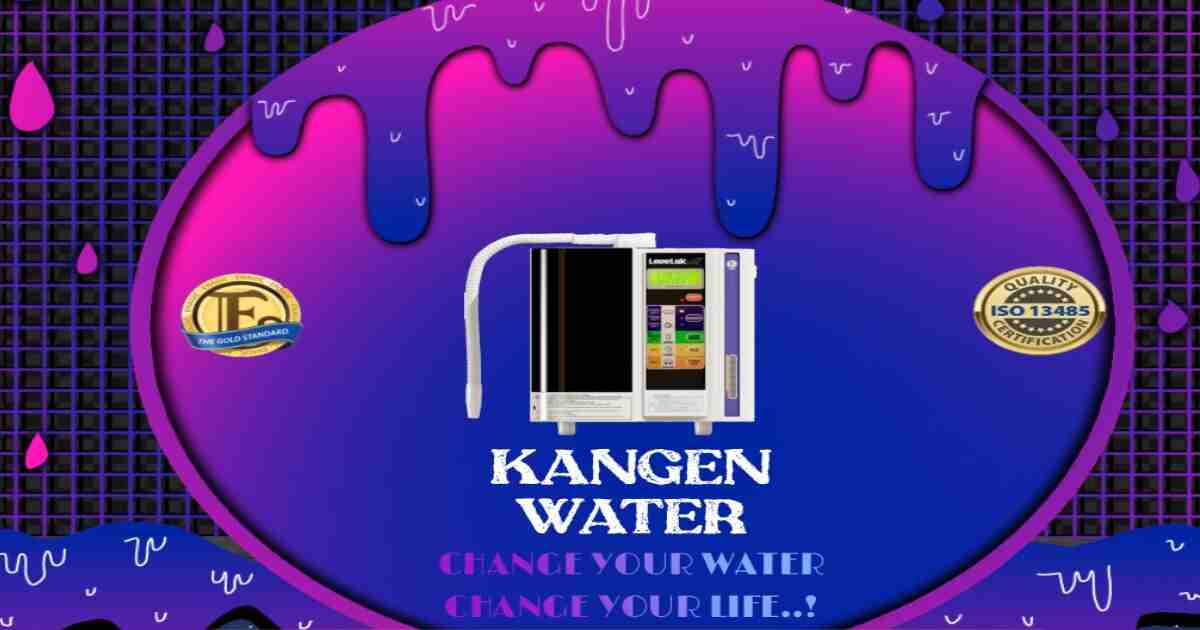Kangen Water: It has gained attention in health and wellness circles, with proponents touting various benefits while skeptics question its efficacy. This report examines what Kangen Water is, how it’s produced, its claimed benefits, and the scientific evidence supporting or refuting these claims.
What is Kangen Water?
Kangen Water is a branded form of alkaline ionized water produced by Enagic, a Japanese company specializing in water ionization systems. The term “Kangen” means “return to origin” in Japanese, suggesting the water helps restore the body to its natural balanced state1. Unlike conventional filtered or bottled water, Kangen Water undergoes a specific electrolysis process that alters its chemical properties, resulting in alkaline water with distinct characteristics.
Kangen Water distinguishes itself from regular tap water in several ways. It maintains a higher pH level (typically between 8.5-9.5), making it alkaline rather than neutral or slightly acidic like most tap water16. Additionally, the water retains minerals that might be lost in other purification methods, potentially contributing to its claimed health benefits1.
Production Process
The transformation from ordinary tap water to Kangen Water involves a two-step process:
- Filtration: Initially, tap water passes through a high-grade filter that removes chlorine, unpleasant tastes, odors, and sediments up to 5 micrometers in size4.
- Electrolysis: The filtered water then flows through an ionization chamber containing electrode plates and membranes. During this process, water molecules (H₂O) are split into hydroxide ions (OH⁻) and hydrogen ions (H⁺)4. The water separates into two streams:
- Around the cathode (negatively charged electrode), hydrogen ions react with electrons to form molecular hydrogen (H₂), while hydroxide ions concentrate, creating alkaline water4.
- Near the anode (positively charged electrode), hydroxide ions release electrons, forming oxygen (O₂), while hydrogen ions remain, creating acidic water4.
The alkaline and acidic waters are separated by membranes and dispensed through different outlets, with the alkaline portion being the Kangen Water intended for consumption4.
Key Properties of Kangen Water
Kangen Water possesses several distinguishing characteristics:
Alkalinity
With a pH ranging from 8.5 to 9.5, Kangen Water is significantly more alkaline than regular tap water (typically pH 6.0-7.0)16. Proponents suggest this alkalinity helps counteract acidic conditions in the body, though the body naturally maintains a narrow pH range of around 7.365 regardless of consumed water1.
Molecular Hydrogen Content
Through electrolysis, Kangen Water becomes enriched with molecular hydrogen (H₂), which dissolves in the water12. This hydrogen content is central to many claimed benefits, as molecular hydrogen can act as an antioxidant by neutralizing free radicals1.
Negative Oxidation-Reduction Potential (ORP)
Kangen Water exhibits a negative ORP value, indicating antioxidant potential1. In contrast, most tap water and many bottled waters have positive ORP values. A negative ORP suggests the water can donate electrons to neutralize free radicals and potentially reduce oxidative stress1.
Claimed Health Benefits
Advocates of Kangen Water attribute numerous health benefits to its regular consumption:
Antioxidant Effects
The molecular hydrogen and negative ORP are claimed to combat oxidative stress by neutralizing free radicals in the body12. Oxidative stress is associated with aging and various chronic diseases, so reducing it could theoretically provide health benefits.
Improved Sleep Quality
Some research suggests consuming alkaline electrolyzed water may improve sleep quality. In a controlled study, participants drinking alkaline electrolyzed water reported feeling they could sleep more soundly and experienced better sensations upon waking2.
Digestive Health
While evidence is limited, some studies suggest Kangen Water may normalize bowel movements. A study observed that stools changed from “slightly soft to normal or slightly hard, or from soft to normal” in subjects consuming alkaline electrolyzed water2.
Other Claimed Benefits
Some proponents make broader health claims, including improved hydration, enhanced energy levels, and support for immune function1. More extreme and scientifically unsupported claims include assertions that Kangen Water can cure serious conditions like Parkinson’s disease, dementia, Alzheimer’s disease, and diabetes3.
Scientific Evidence and Research
The scientific community’s stance on Kangen Water and similar alkaline, hydrogen-rich waters presents a mixed picture:
Longevity Studies
A three-year murine study published in 2016 investigated alkaline water’s effects on longevity. The research suggested mice consuming alkaline water showed better survival rates than control mice, particularly after the second year of life6. The study concluded that alkaline water might provide higher longevity in terms of a “deceleration aging factor”6.
Human Clinical Trials
A double-blind, randomized controlled trial investigated the effects of daily consumption of alkaline electrolyzed water (AEW) containing hydrogen. While the study did not specifically select participants with gastrointestinal symptoms, it noted some improvements in bowel normalization and sleep quality2. The researchers suggested that the antioxidant properties of hydrogen might contribute to improved sleep by reducing oxidative stress2.
The same study observed a trend toward increased HDL cholesterol (often called “good cholesterol”) in participants consuming hydrogen-rich water, though the result fell just short of statistical significance (p = 0.097)2.
Limitations of Research
Despite some promising findings, research on Kangen Water specifically remains limited. Many studies focus on alkaline water or hydrogen-rich water generally, rather than Kangen Water’s proprietary formulation. Additionally, sample sizes are often small, and long-term human studies are lacking.
Controversies and Criticisms
Kangen Water has faced considerable skepticism and criticism from various quarters:
Scientific Skepticism
Critics argue that many claimed benefits lack robust scientific support. A particular point of contention is the body’s natural pH regulation—stomach acid (pH 1.5-3.5) would quickly neutralize any alkaline water consumed, preventing systemic pH changes3. This challenges claims about alkaline water’s ability to significantly alter the body’s pH balance.
Marketing and Business Model
Kangen Water machines are distributed through a multi-level marketing (MLM) model that some critics characterize as misleading3. The high cost of Kangen Water systems—starting around $3,000—has raised questions about value compared to other water filtration options3.
Product Quality Concerns
Some critics describe Kangen Water machines as “glorified water filters with the lowest grade Chinese filter,” questioning whether the technological benefits justify the premium price3.
Conclusion
Kangen Water represents a specific type of alkaline, hydrogen-rich water produced through electrolysis. While some scientific evidence suggests potential benefits related to its antioxidant properties, digestive health effects, and possibly sleep quality improvements, many claims remain inadequately supported by rigorous research.
The high cost of Kangen Water systems and the controversial marketing approaches warrant consumer caution. Individuals interested in alkaline or hydrogen-rich water might consider evaluating the scientific evidence, consulting healthcare providers, and exploring more affordable alternatives before investing in expensive ionization systems.
As with many health products, the reality likely falls between the enthusiastic claims of proponents and the dismissive stance of critics. Future research may clarify which, if any, of the claimed benefits stand up to scientific scrutiny.
Read More: भारताच्या वैद्यकीय क्षेत्राला झाले तरी काय?










